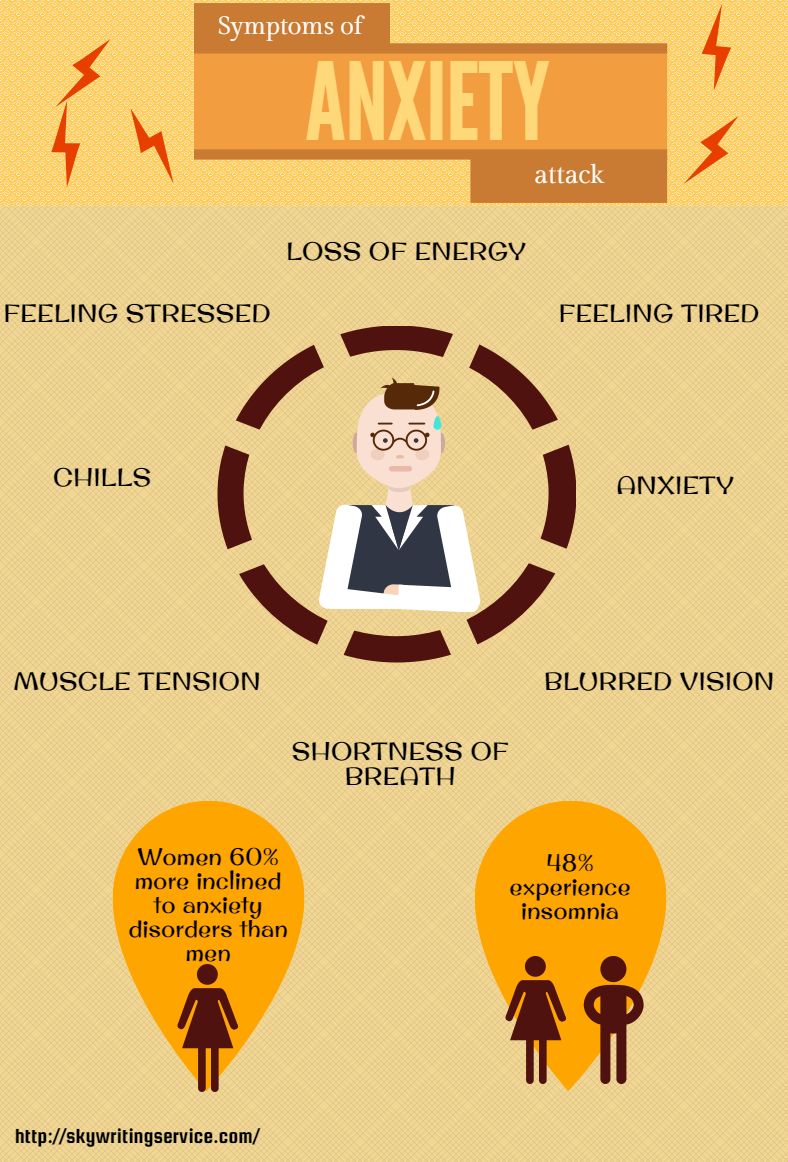Anxiety attack or panic attack, according to Wikipedia, is an inexplicable panic attack, accompanied not only by sudden fear, but also by various somatic symptoms. The reasons for this disease can be quite different: including daily stress, experienced by the person and difficult life situations, together with genetic predisposition.
Usually, symptoms of this disease are peculiar to people with particular character. Experts say that people of anxiety and suspicious personality types are more predisposed to anxiety attacks, because the level of anxiety hormone in their blood is a little bit increased, in comparison to other people. Panic disorder is often skillfully disguised under other diseases, which is why it is important to know the basic symptoms. Panic attacks are accompanied not only by a keen sense of fear. Quite often inexplicable anxiety causes a range of external symptoms, sometimes visible even to the naked eye. Among such characteristics we can distinguish:

Physical sensations. Rapid heart rate, sweating, chills, dyspnea, sensation of shortage of air, shortness of breath, nausea. Most patients complain about discomfort in the heart in any case.
Psychological component. People suffering from panic attacks are susceptible to acute sense of panic during an attack. They are always afraid of possible death, afraid to go crazy. Sometimes their surroundings seem unreal to them, so they begin to beat in hysterics, convulsions, screaming and calling for help.
Each patient attack develops individually and requires a separate observation.
Nevertheless, the main symptom of the disease remains the same: the upcoming anxiety, which may vary from the internal voltage to a vivid feeling of panic. However, with the development of the disease, anxiety is reduced and yields other characteristics.
How to cope with panic attacks?
Psychiatrists believe that anything can cause panic attack: starting the record that causes unwanted memories, up to a random meeting with an old acquaintance. If you are close to someone who needs help in dealing with an anxiety attack, your main and only task is to stay calm and relaxed. Take the patient's hands, tell him that everything is okay and ask him to relax. Help him normalize breathing, performing breathing exercises with him aloud. Do not leave the person in such a condition and wait until the anxiety attack is over.
How to treat anxiety attacks?
It is necessary to start the treatment as soon as possible, as this diseases tends to progress. During its development the frequency of attacks is increasing and the persistent fear of reality develops. Treatment is carried out in several steps:
Consultations from specialists: therapist, psychiatrist, cardiologist and neurologist. All of them have to take out the verdict and confirm the disease.
Every doctor has his own methods of study. Psychiatrists prefer to use psychological tests, for example.
Another important step is to stop the attack. Next, you need to stop all the secondary symptoms (depression, hypochondria, and so on.), And take care of the prevention of relapse.
Cupping and treatment of the disease can be carried out in two ways: standard (medicated drugs, psychological help, and physiotherapy) and traditional ones (herbs).
The standard method of treatment involves the combination of medications and psychological treatments. Among the medicines, tranquilizers and antidepressants are usually being used, as they facilitate the manifestation of physical symptoms. In its turn, psychotherapy uses all possible means to relieve disorders of consciousness.
We should always remember that all the problems and diseases are coming from our negative thoughts and emotions. Each of us can easily get rid of anxiety attacks, following simple rules. We should do our best to remain calm and relaxed, in order to remain healthy. It is very important to learn how to control yourself. Try to do this, and very soon you will see that anxiety attacks are gone.